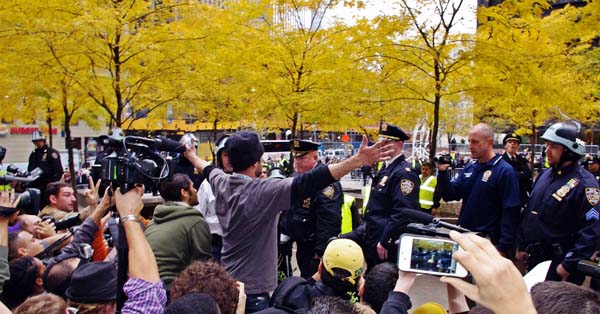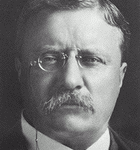We’ve Occupied This Street Before
Random thoughts (well, not all that random) on wealth and commonwealth

Occupy Wall Street, Nov. 15, 2011 (Photo by David Shankbone)
TO: Occupy Wall Street
FROM: Dead White Male Republican
- The conscienceless stock speculator who acquires wealth by swindling his fellows, by debauching judges and corrupting legislatures, and who ends his days with the reputation of being among the richest men in America, exerts over the minds of the rising generation an influence worse than that of the average murderer or bandit, because his career is even more dazzling in its success, and even more dangerous in its effects upon the community.
- [W]hen wealthy men … indulge in reckless speculation—especially if it is accompanied by dishonesty—they jeopardize not only their own future but the future of all their innocent fellow citizens, for they expose the whole business community to panic and distress.
- The men of great wealth who are careless of the welfare of the average citizen of our country are laying up an evil harvest for their own children. … [T]he growth of misery in any one great class will ultimately make its baleful effects felt through all classes.
- [Property rights] can only be preserved if we remember that they are in less jeopardy from the socialist and the anarchist than from the predatory man of wealth. It has become evident that to refuse to invoke the power of the nation to restrain the wrongs committed by the man of great wealth who does evil is not only to neglect the interests of the public, but is to neglect the interests of the man of means who acts honorably by his fellows.
- The true friend of property, the true conservative, is he who insists that property shall be the servant and not the master of the commonwealth.
- The government ought not to conduct the business of the country; but it ought to regulate it so that it shall be conducted in the interest of the public.
- The corporation must be protected, must be given its rights, but it must be prevented from doing wrong; and its managers must be held in strict accountability when it does wrong; and it must be deprived of all secret influence in our public life.
- It is essential that we should wrest the control of the Government out of the hands of rich men who use it for unhealthy purposes, and should keep it out of their hands.
- Of all forms of tyranny the least attractive and the most vulgar is the tyranny of mere wealth, the tyranny of a plutocracy.
- There can be no delusion more fatal to the nation than the delusion that the standard of profits, of business prosperity, is sufficient in judging any business or political question.
- We demand that big business give the people a square deal; in return we must insist that when any one engaged in big business honestly endeavors to do right he shall himself be given a square deal.
- [I]n the long run, we all of us tend to go up or go down together.
 —Theodore Roosevelt (1858-1919)
—Theodore Roosevelt (1858-1919)
(as curated by Patricia O’Toole)

